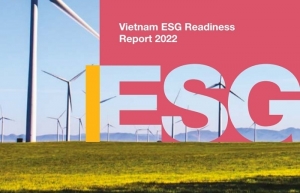Accompanying customers on ESG journey
Firstly, ESG is not a nice to have, it is a hygiene factor for doing business. Considering ESG factors can help companies to identify the risks, and related costs and savings, that go beyond traditional accounting.
 |
| Nguyen Thuy Hanh, deputy general director and head of Commercial, Corporate and Institutional Banking at Standard Chartered Vietnam |
An awareness of this means becoming ready to recognise these costs and saving, and eventually financial opportunities for the company, and acting upon them from an operational, managerial, and strategic point of view.
Secondly, you should try to understand both the impacts of your business on the world, and also the impact the world can have on your business.
The governance is the second and most important step to identify accountability and responsibility from the board and top management to the operating functions and business units. ESG is not the job of one unit or one person, it has to be integrated into every function and operation – and be measured.
Thirdly, there are a number of things that ESG covers, and having a clear mindset on what is important for your business will help define your ESG identity.
Also, there is an ecosystem role that each business plays with its own stakeholders, where your ESG identity will find its scope.
For example, the major cross-cutting theme is energy and climate change. How do we get through the short- and medium-term challenges? And what is my business doing to change to meet this goal and to contribute to the solution?
Finally, is making sure what you do is disclosed and reported in a transparent and truthful manner. This will help not just create discipline in accounting for your ESG actions and implementation, but also make sure that your stakeholders understand what you are doing in a framework they recognise and in a fashion they can credit.
| Standard Chartered has been acting as a strong partner on ESG and sustainable finance for clients, with increasing focus on helping them to decarbonise and transition. |
Standard Chartered has been acting as a strong partner on ESG and sustainable finance for our clients, with increasing focus on helping them to decarbonise and transition.
Under the direction of our new chief sustainability officer, Marisa Drew, and our commitment to the Asian, African, and Middle Eastern markets, we have expanded our sustainable finance asset books to over $13 billion in 2022, representing a 30 per cent growth on-year.
As per our bank’s Sustainable Finance Impact Report 2022, Vietnam has recorded over $50 million in renewable energy exposures and another $50 million in business banking loans supporting access to finance.
With over 30 product variants for sustainable finance and a team of 100 specialists skilled in various areas of the sustainability practice, we are confident in helping clients at various stage of their ESG journey confidently access the most innovative services and products for sustainable finance, transition finance, blended finance, and carbon markets.
We like to consider our client proposition a virtuous cycle that starts with the assessment of our client positioning in terms of ESG and climate risk particularly. We have a team of more than 40 people who have extended the work of our enterprise security risk team into climate and transition analysis. Their work formulates the transition maturity of our client and the contribution of our exposure to their financing into our financed emission. It is also a way for us to see where clients need our support the most.
The ESG Advisory Team is another new unit that has been operating over the last two years, supporting clients on their journey towards implementing ESG, helping with reporting and disclosure, and setting their sustainability and transition roadmap. It helps identify where our clients need to improve and guides them through it to allow them to take the best opportunities in transition or sustainable finance.
We continue to see an acceleration in the types of advisory services for ESG, with sustainability and transition being what most corporate clients are asking for. Our most requested services are for ESG roadmaps and rating advisory services.
Roadmaps can be for every stage of the ESG journey. Some corporates need to start their own implementations, others already have a well-defined sustainability or transition plan and just need support in the execution. More of our focus is on tools to make the action happen more easily, like disclosure platforms, scorecards, or even asset level registry.
When we started our practice, clients would ask for support to improve their ESG rating, first acknowledging the need to look good when faced with third-party evaluation – regardless of whether they were bringing any meaningful changes to their business.
At the same time, ESG ratings came under the spotlight due to the risk of greenwashing, discrepancies among agencies, and the growing number of new local ESG ratings agencies.
Even supported by multiple shifts with mainstream ESG rating integration in the investment process, regulations, the ESG rating agencies system, and banks' broad use of ratings, they remain a vast grey area and represent a complex and strategic area to navigate through.
As such, and more than ever, we provide clients with an in-depth understanding of investors’ ESG ratings expectations and ESG rating agencies’ requirements. That’s exactly where the ESG Advisory Team has decided to provide added value to our clients.
Our client conversations have widely benefitted them, as our ESG rating expertise broadens the scope of discussions and allows us to engage with them in more depth. As such, what we provide is not only advice for reaching the best ESG rating outcome, we empower our clients because we support them in their effort and be here for good along with us.
Through our analysis that is aligned to the ESG rating expectations, we can broaden the usual scope of discussions with clients. At the same time, we offer ESG ratings that have an internal enabler, so they can be a competitive advantage in mainstream transactions.
Standard Chartered published our own net-zero commitments in 2021, with transparent metrics and targets for our lending exposure to high emitting sectors. We committed to mobilising $300 billion in transition finance before 2030. Our sustainable finance and industry experts are actively helping clients with transition plans, strategies, structuring, and products, all guided by our transition finance framework.
 | Report scrutinises pathway for ESG agenda in financial sector A fresh PwC Vietnam report has provided insights into the level of readiness by financial institutions in Vietnam in terms of environmental, social, and governance (ESG) criteria. |
 | How real estate developers can benefit from ESG considerations Gaining in popularity in recent times, environmental, social, and governance criteria refers to the standards used to evaluate business practices in these areas. |
 | The way forward to consider both sustainability and ESG Last year was not a good year for environmental, social, and governance (ESG) funds and their performance has been held back. After years of dramatic growth, investment in ESG securities has sharply declined, with research firm Morningstar reporting a 70 per cent drop in inflows compared to the year before and the number of new funds launched is down by 60 per cent. |
 | Office developers inclined to incorporate ESG standards Integrating environmental, social, and governance elements is the latest survival strategy for operators of leased office buildings, with experts noting that issues remain with post-pandemic workspace changes. |
What the stars mean:
★ Poor ★ ★ Promising ★★★ Good ★★★★ Very good ★★★★★ Exceptional
Related Contents
Latest News
More News
- EVN awards EPC contract for Quang Trach II LNG project (February 10, 2026 | 09:00)
- Canada backs Vietnam’s green transition with AGILE project (February 09, 2026 | 17:41)
- Momentum is real in the race to net-zero emissions (February 02, 2026 | 08:55)
- $100 million initiative launched to protect forests and boost rural incomes (January 30, 2026 | 15:18)
- Trung Nam-Sideros River consortium wins bid for LNG venture (January 30, 2026 | 11:16)
- Vietnam moves towards market-based fuel management with E10 rollout (January 30, 2026 | 11:10)
- Envision Energy, REE Group partner on 128MW wind projects (January 30, 2026 | 10:58)
- Vingroup consults on carbon credits for electric vehicle charging network (January 28, 2026 | 11:04)
- Bac Ai Pumped Storage Hydropower Plant to enter peak construction phase (January 27, 2026 | 08:00)
- ASEAN could scale up sustainable aviation fuel by 2050 (January 24, 2026 | 10:19)

 Tag:
Tag:


























 Mobile Version
Mobile Version